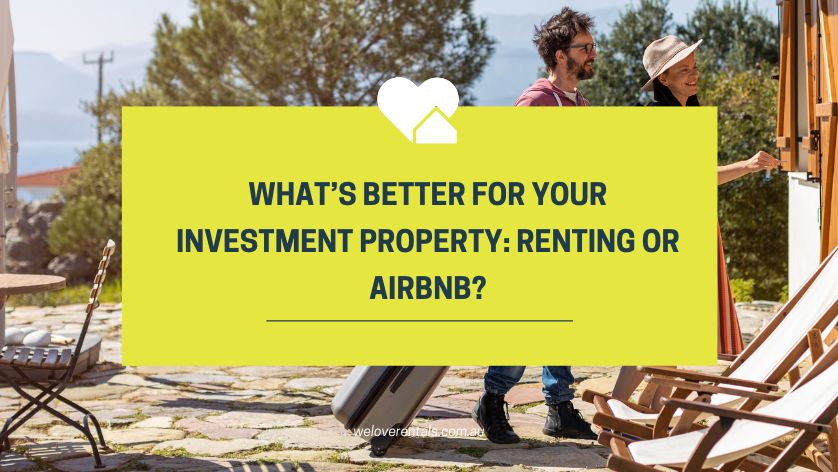
Renting vs Airbnb – Which is Best for Your Investment Property?
If you’re reading this, you probably already own an investment property. Or perhaps you’re about to and want to do your due diligence first.
Like most investors, you’ll want to maximise your rental returns!
Airbnb reportedly provides strong returns, so it’s an option certainly worth exploring.
However, savvy property investors don’t just consider short-term returns. Their strategies reflect their personal situation and long-term objectives – they also invest in suburbs with strong rental returns.
To assist with this complex decision, here is our advice on Airbnb vs renting in Australia for property investors:

Pros and Cons of Airbnb vs. Renting to Tenants
Short term rental accommodation options like Airbnb have some tempting pros, and unexpected cons.
Airbnb Versus Long-Term Tenancy: The Data
Data isn’t scarce on this topic — but different sources report very different data.
One thing is certain: Airbnb returns vary, depending on the property’s appeal and location, so average returns don’t accurately predict returns for individual properties.
We recommend researching returns by locality and comparable type of property. If online platforms/calculators give varied responses, try contacting local Airbnb hosts or managers.
Airbnb |
Traditional Tenancy |
|
| Yield | ||
| Gross Yield (income before expenses) | 10% – 20% of property value | 5% to 10% of property value |
| Costs | ||
| Property Management fees | 10% – 20% of income | 6% – 10% of income |
| Airbnb host fees | 15% of accommodation cost if software-connected | N/A |
| Initial Investment | Variable. Airbnbs are usually more upmarket and better located than standard rentals, so cost more to buy.
They must be fully furnished/equipped — estimate $8000 for a 2BR + $2000 per extra bedroom |
Variable, any standard from liveable to upmarket, any location, so less costly.
Furniture and chattels not required. |
| Maintenance | 10% -15% of turnover | 1.5 to 2 x monthly rent or 1-2% of property value |
| Other Issues | ||
| Time commitment — professionally managed | Low | Low |
| Time commitment — self-managed | High — can require 24/7 availability | Moderate |
| Access for maintenance/personal use | Virtually unlimited (bookings can be declined) | Limited by lease dates, Tenancy laws |
| Occupancy/income consistency | 55%-86% depending on area/property/host rating
Income fluctuates |
96%-100%
Income usually consistent |
| Legal/other constraints | Local/State laws* e.g. planning laws
Strata laws and Strata by-laws** Building Code Airbnb regulations |
Tenancy laws
Strata laws Building codes |
* NOTE: Due to extreme rental shortages, regulatory changes are proposed in some areas, aimed at making Airbnb less attractive to owners.
** Strata by-laws may not allow for running an Airbnb or may make it very difficult, so ask for a copy of the by-laws before you buy!
For more details, see our post Airbnb – Should You List Your Property on this Platform?
So What Research is Recommended?
Even though Airbnb looks highly profitable at first glance, do your homework!
First, decide whether you have the time and inclination to self-manage your rental property. Ask Airbnb hosts how much of their time it takes up, and about any other downsides (e.g. late night arrivals, damage).
The popular Airhosts Forum has a wealth of information and Soho.com.au uses AI technology to match you with properties automatically.
Then estimate costs realistically, factoring in management fees if appropriate.
Other key points to consider include:
- whether the property you own/are buying, suits Airbnb — upmarket properties, CBD/beach locations, and properties near universities/transport hubs with good ‘walkability’ do well
- whether buying property suited to Airbnb is affordable
- whether cash flow or long-term capital growth is your priority — units don’t grow in value as much as houses
- what the tax implications are — ask your accountant
- whether your cash reserves will cover low-income periods/seasonal downturns, maintenance and other expenses.
In addition, you can check out platforms like AirDNA, Airbtics, and Finder. They specialise in Airbnb data, but be aware their accuracy is sometimes questioned given fluctuating numbers.
Given these inconsistencies, when assessing what earnings are achievable from Airbnb versus renting, information sourced directly from Airbnb managers and local property managers can be invaluable.
So Where to from Here?
Start your research by talking to our experienced property management specialists at We Love Rentals. Get a clear idea of what your property can achieve as a long term rental — you may be pleasantly surprised!
Why not email us or call (08) 6254 6300 to chat about managing your property?
Our property management team will offer friendly, independent advice!

